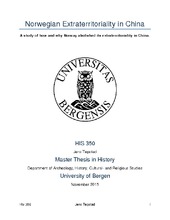| dc.contributor.author | Tepstad, Jens Einar Fauskanger | |
| dc.date.accessioned | 2015-12-17T13:30:19Z | |
| dc.date.available | 2015-12-17T13:30:19Z | |
| dc.date.issued | 2015-11-18 | |
| dc.date.submitted | 2015-11-18 | eng |
| dc.identifier.uri | https://hdl.handle.net/1956/10776 | |
| dc.description.abstract | In this master thesis I have investigated how and why Norway abolished its extraterritoriality in China. Extraterritoriality was a privilege that allowed Norwegians, as well as other foreign citizens in China, to be sentenced by their own national laws instead of the Chinese ones. This privilege was originally established by Great Britain in 1842 and then later extended to other foreign powers throughout the 19th century. This happened mainly because Western nations deemed the Chinese laws to be unjust, brutal and arbitrary and thus incapable of guaranteeing the safety and judicial rights of its foreign population. Hence extraterritoriality was enjoyed by Western citizens for about a century until the mid 1940s. In this thesis I have examined how and why Norway positioned itself and participated in the abolishment-processes of foreign extraterritoriality in China. I have explored as well as investigated the correspondence between the Norwegian diplomats in China and the Norwegian government. I have through this examined how the correspondence reflects the Norwegian role within this process. I have also made use of several specialist studies that have researched extraterritoriality in China as a historical phenomenon, and thereby attempted to put my Norwegian findings into a greater context. I have also tried to see how the general historical developments in both China and Norway may be understood as contexts for the decisions that were made. Conclusively I have seen that Norway and China agreed in 1931 that Norway would abolish its extraterritoriality in China when all the other treaty powers did the same. This mutual understanding lasted for over a decade, Norwegian citizens thereby continued to enjoy their extraterritorial privileges while the negotiations between China and the great powers persisted. These negotiations lasted until the Second World War, when Great Britain and the United States agreed to abolish their extraterritoriality in 1943. Norway then followed their example and abolished its extraterritoriality the same year just as earlier promised. | en_US |
| dc.description.abstract | I denne masteroppgaven tar jeg for meg hvordan og hvorfor Norge avsluttet sin ekstraterritorialrett i Kina. Ekstraterritorialretten var et privilegium som tillot nordmenn, så vel som andre utenlandske borgere i Kina, retten til å bli dømt etter sitt eget lands lover istedenfor de kinesiske. Denne retten hadde opprinnelig blitt etablert av Storbritannia i 1842 og senere utvidet til andre vestlige land i løpet av det nittende århundret. Dette skjedde i hovedsak fordi de vestlige nasjonene mente at kinesiske lover var urettferdige, brutale og vilkårlige og dermed ute av stand for å kunne garantere sikkerhet og rettferdig behandling av utlendingene. Dermed benyttet vestlige lands borgere seg av denne retten i nærmere hundre år, helt frem til midten av 1940-tallet. I denne masteroppgaven har jeg undersøkt hvordan Norge stilte seg til, og deltok i, aviklingsprossessene av ekstraterritorrialretten. Jeg har gjennomgått og undersøkt korrespondansen mellom de norske diplomatene i Kina og styresmaktene i Norge. Gjennom dette arbeidet har jeg sett hvordan denne korrespondansen reflekterer Norges rolle i denne prosessen. Jeg har også benyttet meg av en rekke tidligere studier som har undersøkt ekstraterritorialretten i Kina som et historisk fenomen, og med dette prøvd å sette mine norske funn inn i en større kontekst. På samme vis har jeg også forsøkt å se hvordan den generelle historiske utviklingen i Kina, så vel som i Norge, har hatt relevans for de beslutninger som ble tatt. Avslutningsvis så jeg sett at Norge og Kina inngikk en avtale i 1931 der Norge lovet Kina å avvikle sin ekstraterritorrialrett når alle andre nasjoner med denne rettigheten også gjorde det. Denne bilatterale overenskomsten gjaldt i over ti år, da norske borgere fremdeles kunne benytte seg av ekstraterritorialrettighetene mens forhandlingene forsatte mellom Kina og stormaktene. Disse forhandlingne varte helt frem til andre verdenskrig, da Storbritannia og USA oppgav sine ekstraterritorriale rettigheter i 1943. Deretter fulgte Norge deres eksempel og oppgav, som avtalt, sine ekstraterritorriale rettigheter samme år. | en_US |
| dc.format.extent | 4724748 bytes | eng |
| dc.format.mimetype | application/pdf | eng |
| dc.language.iso | eng | eng |
| dc.publisher | The University of Bergen | eng |
| dc.subject | Norwegian Extraterritoriality China Abolishment abolition | eng |
| dc.title | Norwegian extraterritoriality in China. A study of how and why Norway abolished its extraterritoriality in China | eng |
| dc.type | Master thesis | |
| dc.rights.holder | Copyright the author. All rights reserved | eng |
| dc.description.degree | Master i Historie | |
| dc.description.localcode | MAHF-HIS | |
| dc.description.localcode | HIS350 | |
| dc.subject.nus | 713107 | eng |
| fs.subjectcode | HIS350 | |
